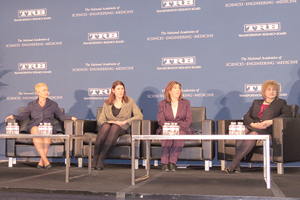Female State DOT Leaders Discuss Common Experiences

Delaware’s Jennifer Cohan, Massachusetts’ Stephanie Pollack, New Hampshire’s Victoria Sheehan and Pennsylvania’s Leslie Richards discussed their paths to their positions and their experiences in them while taking questions from former Nevada DOT chief Susan Martinovich and ex-Washington State DOT boss Paula Hammond.
The overarching theme of the conversation was an emphasis on customer service, a focus of Cohan’s since she was a 16-year-old clerk in Delaware’s Department of Motor Vehicles. Cohan, who was talked into the job by then-Gov. Jack Markell after the 2014 elections, was recently re-appointed by his replacement, John Carney.
Like Cohan, Sheehan, a native of Ireland and an engineer by training, is a DOT lifer, having spent most of her career in Massachusetts before taking over in New Hampshire last year at the request of then-Gov. Maggie Hassan.
In contrast, Pollack has spent most of her career in academia and this is her first government job. Richards had worked in local government, among other fields, before she assumed command as Pollack did in January 2015.
“[Former Washington State DOT Secretary] Lynn Peterson used to say that this is the most exciting time to be in transportation since the Romans invented the road, and I definitely agree,” Pollack said.
“And only by working at a DOT can you set and implement policy,” Richards added.
Before Cohan took over in Delaware, she said that DOT workers closed lanes without warning or considering how that would inconvenience drivers. She immediately changed that policy. Pollock did the same in quickly improving the customer experience at the Registry of Motor Vehicles. Richards has been particularly innovative with smartphone applications.
There were also tales of how just being in their jobs have inspired their female employees, many of whom were used to being the only woman in the room in transportation meetings.
Sheehan wants to bring a different kind of change to New Hampshire’s DOT.
“We’re not known for being nimble,” Sheehan said about the rapid pace of such technological change as autonomous vehicles. “We need to fill the ranks with those who think outside the box.”
Which is how those who hired the female leaders put them in their roles.




